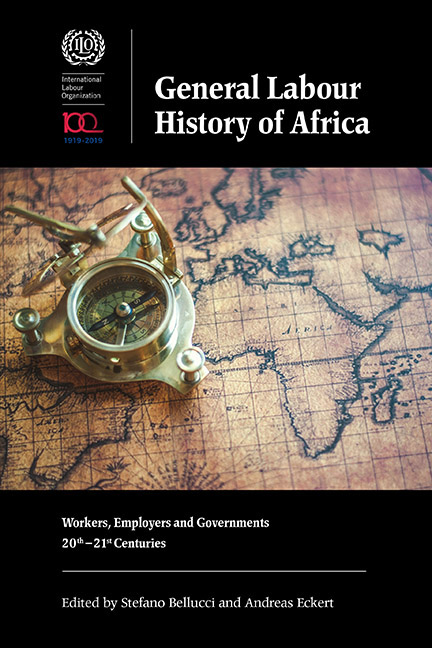Book contents
- Frontmatter
- Contents
- List of Maps and Figures
- List of Tables
- Notes on Contributors
- Foreword
- Acknowledgements
- The ‘Labour Question’ in Africanist Historiography
- Part I Free and Unfree Labour
- Part II Key Sectors
- Part III International Dimensions and Mobility
- Part IV Varieties of Work
- 10 Domestic Work
- 11 Military and Police
- 12 Crime and Illegal Work
- 13 White-Collar Workers
- 14 Sport, Tourism and Entertainment
- Part V Entrepreneurs and Self-Employment
- Part VI The State, Unions and Welfare
- Part VII Conclusions
- Select Bibliography
- Index
12 - Crime and Illegal Work
from Part IV - Varieties of Work
Published online by Cambridge University Press: 21 September 2019
- Frontmatter
- Contents
- List of Maps and Figures
- List of Tables
- Notes on Contributors
- Foreword
- Acknowledgements
- The ‘Labour Question’ in Africanist Historiography
- Part I Free and Unfree Labour
- Part II Key Sectors
- Part III International Dimensions and Mobility
- Part IV Varieties of Work
- 10 Domestic Work
- 11 Military and Police
- 12 Crime and Illegal Work
- 13 White-Collar Workers
- 14 Sport, Tourism and Entertainment
- Part V Entrepreneurs and Self-Employment
- Part VI The State, Unions and Welfare
- Part VII Conclusions
- Select Bibliography
- Index
Summary
Many expressions in African societies identify groups that operate between the legal and illegal at the frontier of petty and serious crime: tsotsis or skollies in South Africa; wahuni in Tanzania; jaguda boys, boma boys or area boys in Nigeria. They designate broad categories that embrace the criminal, the delinquent, the young and the jobless. For a large section of society, these common labels represent the embodiment of danger, disorder, crime and delinquency. To consider an unemployed young person and a leader of a gang as belonging to the same category shows the difficulty in disentangling joblessness and crime, the need to investigate the permanently shifting frontier between legal and illegal labour and to recognize the difficulty in capturing what constitutes crime in various African countries.
Crime in the African continent has been shaped by different imperial and national legal histories. In English-speaking countries, the term ‘crime’ is often used to designate an offence committed by adults, as opposed to ‘delinquency’, which is associated most of the time with juvenile offenders. By contrast, in French-speaking countries, ‘crime’ is used to designate the most serious offences which require severe penalties. Instead of emphasizing these particular distinctions, I will use ‘crime’ as a behaviour or action prosecuted by the law that threatens the perpetrator with a penalty. This conventional definition is complicated by the fact that many African countries have inherited various legal histories of different origins (European and Islamic, as well as local traditions reshaped by colonial and national laws). Studying crime thus implies looking at incriminating processes, that is, the making of criminal codes, but also understanding what is locally perceived as crime in a continent in which the state's monopoly on law and order is far from obvious.
Illegal labour is a notion that is no less ambivalent. Legal definitions are scarce at the global level. For the Organisation for Economic Co-operation and Development (OECD), illegal work concerns persons who are not legally authorized to work. This may involve, for instance, work by children below the prescribed minimum age, migrant workers without work permits or government employees who hold a second job incompatible with the duties of their first job.
- Type
- Chapter
- Information
- General Labour History of AfricaWorkers, Employers and Governments, 20th-21st Centuries, pp. 361 - 378Publisher: Boydell & BrewerPrint publication year: 2019



